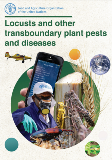Desert Locust: Managing the Pest and Protecting People and the Environment
FAO calls for “robust coordination” to prevent and combat further outbreaks

The Food and Agriculture Organization of the United Nations has called for ‘’robust coordination’’ between countries and regions in efforts to prevent and combat the scourge of desert locusts. “Desert locusts – as migratory pests – cannot be controlled by one single country or one single entity,” FAO Deputy Director-General Beth Bechdol told participants at a high-level webinar today.
The desert locust (Schistocerca gregaria) is the world’s most voracious migratory pest. The recent upsurge in East Africa, Yemen and elsewhere have shown how quickly they can reproduce and spread from one country to another, often with devastating consequences, threatening food security and livelihoods.
Bechdol said greater collaboration was needed between countries where breeding and outbreaks occurred to improve surveillance, early forecasting and innovative action to fight the pests and stop their cross border migration.
FAO has a long-standing commitment to fight desert locusts
FAO has been coordinating global programmes for sustainable desert locust management since 1955. However, the biology and behaviour of the desert locust makes it particularly challenging to monitor and control.
Working with Members and partners, FAO has successfully managed 18 outbreaks in the past two decades, including two major upsurges, the first in 2003–2005 in the Western Region and more recently in 2019–2021 in the Near East, Southwest Asia and East Africa.
Desert locust monitoring, early warning, forecasting and control are enhanced through the Organization’s Global Desert Locust Information Service (DLIS) which monitors the situation in 60 countries.
At the field level, FAO operates three Desert Locust Regional Commissions: the Commission for Controlling the Desert Locust in the Western Region, the Commission for Controlling the Desert Locust in the Central Region, and the Commission for Controlling the Desert Locust in South-West Asia.
Bechdol underlined the tremendous achievements made by the commissions as well as FAO’s efforts in helping Members in managing the desert locust. “We have collectively controlled and managed potential crises and made substantial progress,’’ said Bechdol.
Seeking innovative solutions to combat desert locusts
Climate change and the impact of human activities are making locust development and behaviour more difficult to predict.
“The effects of extreme weather events and climate change are affecting the desert locusts’ development and are actually making their behaviour even more unpredictable,” she said, and also noted the need to be faster and more agile.
Bechdol said there was a need for a more dynamic approach to preparedness and called for the broader application of biological pesticides to safeguard human and animal health and the environment.
FAO has developed locust management guidelines and operating protocols to guide the planning and execution of control campaigns so that operations are safe for human, crop and environmental health.
Affected countries shared their experiences
Speakers at the event included four high-level national representatives:
- Hamid Bensaad, Secretary General of the Ministry of Agriculture and Rural Development of Algeria;
- Meles Mekonen, State Minister for Agriculture of Ethiopia;
- Moma Ould Beîbate Hamahoullah, Minister for Agriculture of Mauritania; and
- Ayman bin Saad Alghamdi, Executive President, the National Centre for the Prevention and Control of Plant Pests and Animal Diseases, Kingdom of Saudi Arabia.
FAO speakers included:
- Abdulhakim Elwaer, Assistant Director-General/Regional Representative, Near East and North Africa;
- Shoki Al-Dobai, Senior Agricultural Officer, Locust and Transboundary Plant Pests and Disease Team Leader;
- Rosanne Marchesich, Food Chain Crisis Operations and Coordination Team Leader;
- Chikelu Mba, Deputy Director of the Plant Production and Protection Division ; and
- Haile Gabriel Abebe, Assistant Director-General/Regional Representative, Regional Office for Africa.
Farayi Zimudzi, FAO Representative in Ethiopia, and Yurdi Yasmi, Special Coordinator, Plant Production and Protection Division, moderated the session.


